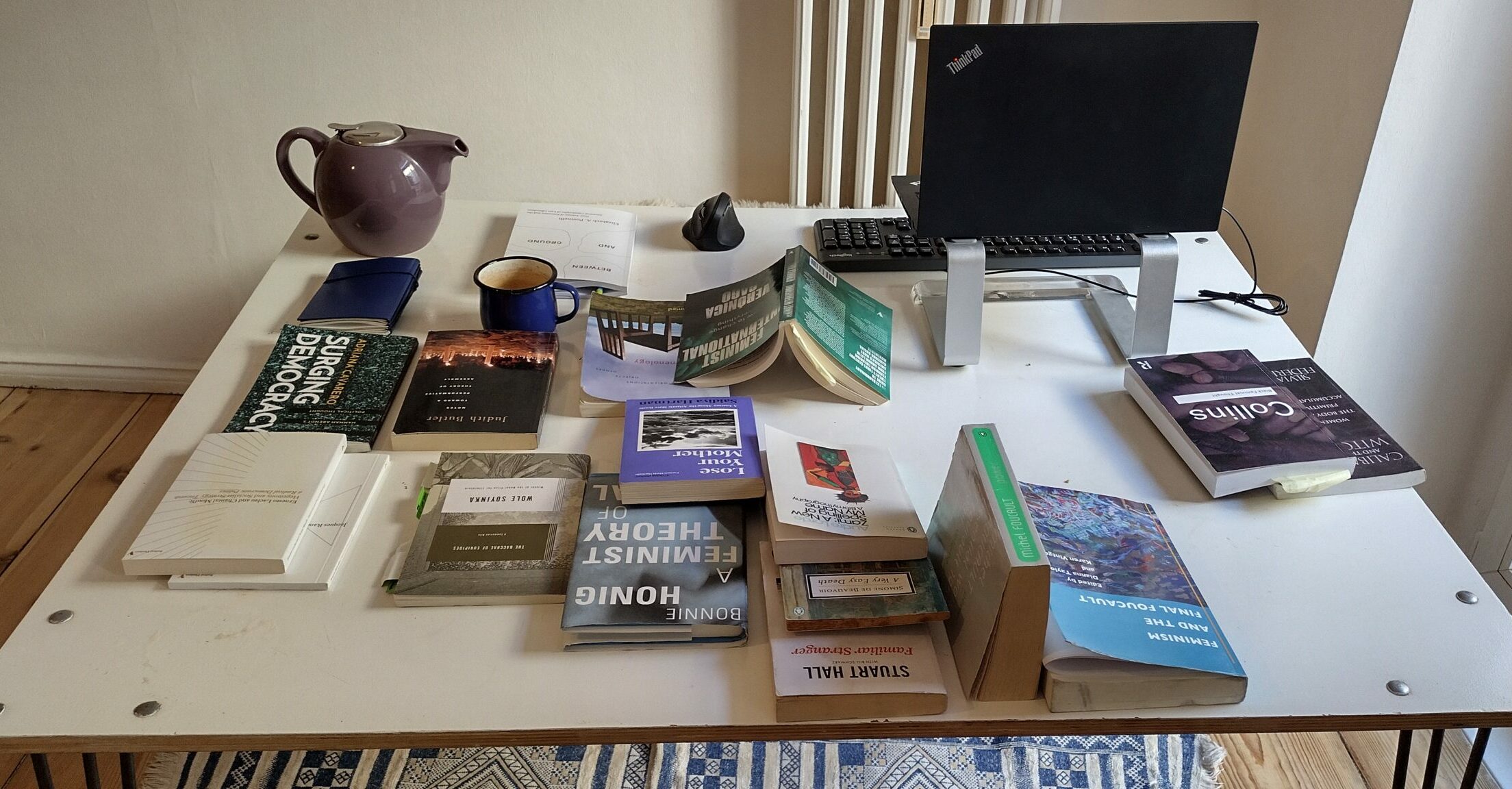In Queer Phenomenology, Sara Ahmed reflects on all kinds of tables: work tables, dining tables, but most of all kitchen tables and desks. She reminds us that a lot of feminist theory has been written at kitchen tables. That was obviously the result of scarcity of space, and the lack of a separate study room of one’s own. But she also praises the versatile use of these tables: by doing theory at a kitchen table, she suggests one is most likely to do theory that attends to the domestic care labor that historically has been relegated to women. My situation is much more privileged as I have a room of my own, but I consider myself lucky for having one table for working, eating, and everything else. Indeed, my deliberate decision not to have a designated home office was vaguely inspired by the idea that I would have to clear out my desk whenever I need the surface for some other task—whenever I have to interrupt reading and writing for the activities of care that enable me to read and write in the first place.
This picture of my table is hence a bit deceiving: at a random other moment, you might not have seen any books. It is also misleading because it presents neatly aligned books that are obviously put there for the purpose of the photo. A ‘table’ can also be taken to mean a surface in which disparate elements are brought together in such a way that new lines of affiliation emerge. Reading the previous posts of #Meinschreibtisch, I enjoyed the many ‘tableaux’ and the links that emerge between books. In my case, these ‘elements’ mostly belong to political theory, feminism, and the intersection of phenomenology and social theory. The books that I casually-intentionally laid out on my table represent three lines that are at the moment particularly predominant in my research. They are central to the collection that I edited, together with Karen Vintges, on Beauvoir’s political thought (forthcoming with Routledge), as well as to my recent publications on resistance and care.
Political Action beyond Assembly
In much contemporary radical democracy, the assembly (and its associated terms, such as the general strike or demonstration) is seen as the paradigmatic case of political action. This form of political action is spontaneous, horizontal, and most importantly, requires the coming-together of people. One of the main concerns in this approach, on my desk exemplified by Arendt, Butler, Cavarero, and Gago, is the closure of public space, as a consequence of which assemblies can no longer take place. I am much indebted to this approach—hence their prominent place on my table—while also grappling with the transience of the assembly. I am interested in extending it to cover actions that do not require physical gatherings. Could we rethink political action, for instance, as serial, that is, actions by individuals that happen consecutively? What is the role of material objects, such as posters and graffiti, in contesting hegemonic notions of gender?
Between Counter-violence and Counter-conduct
The assembly is a moment of nonviolent political action, as Butler and many others would argue. As such, it enacts a mode of being together that fosters individual uniqueness. My recent work has been concerned with forms of resistance that allow for this unicity—typically through the work of Arendt, and I believe it can also be found in a somewhat incomplete manner in Foucault’s account of friendship. What I take from their analyses, is the devastating political implications of isolation and individualization, and the need to invent and revalue new communities and new forms of affective relationships—a concern very much shared, of course, with much feminist and queer theory. Such new communities might be called, to use a Foucaultian term, counter-conduct. At the same time, and inspired by the recent work of Honig as well as Beauvoir’s Ethics of Ambiguity, I am mindful that many relational accounts neglect the conflicts between an ethics based on the other person’s unicity, and a politics aiming to ameliorate the conditions under which we live – with the latter occasionally requiring actions that might come at the expense of ethical claim to be recognized as a unique self.
Storytelling and Motherhood
Honig reminds us of this conflict between ethics and politics, between care for the other and care for the world, in her recent retelling of the Bacchae, the tragedy in which Pentheus is killed by his mother Agave. Honig visited our research unit last January for a symposium that I co-organized, and in her reading (Honig 2021), Agave rebels against her role as a mother and against the regime of her son, the king. Honigs’s argument resonates with longstanding feminist attempts to demystify motherhood, and also shows the importance of storytelling for political theory. I am currently drafting a response to her latest book, in which I aim to further complicate the central role of kinship relations in the Bacchae, by cross-reading it with Soyinka ’s retelling of the tragedy as well as Hartman’s critical fabulations on transatlantic slave trade. More generally, I try to rethink of care beyond the dyadic model of mother and child, for which it has been immensely helpful to turn to (auto)biographical works, such as those of Lorde and Beauvoir.
In her discussion of tables, Ahmed writes how kitchen tables in particular are sites where we convene with people we care about. “Tables for feminist philosophers might not bracket or put aside the intimacy of familial attachments; such intimacies are at the front; they are ‘on the table’ rather than behind it” (Ahmed 2006, 62). These ‘familial attachments’ do not only emerge with people of flesh and blood, but also of paper and ink; and our chosen family can consist of our closest friends, dearest family members, and the books we love.
Literature
Ahmed, Sara. 2006. Queer Phenomenology: Orientations, Objects, Others. Duke University Press.
Honig, Bonnie. 2021. A Feminist Theory of Refusal. Harvard University Press.
Liesbeth Schoonheim is Postdoctoral researcher at the Research and teaching area Political Theory at Humboldt Universität. Previously, she was a junior postdoctoral research fellow in philosophy at KU Leuven, Belgium, where she also obtained her PhD with a thesis on Arendtian narrativity. She has published on themes at the intersection of political theory, social theory and feminism, such as resistance, corporeality, and historiography. She currently co-organizes an international conference on “Rewriting the History of Political Thought from the Margins.” She is an editorial board member of Krisis, a journal of political and social philosophy, and a board member of SWIP-NL.

